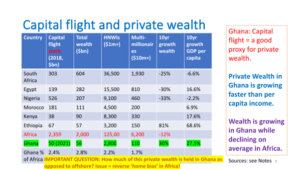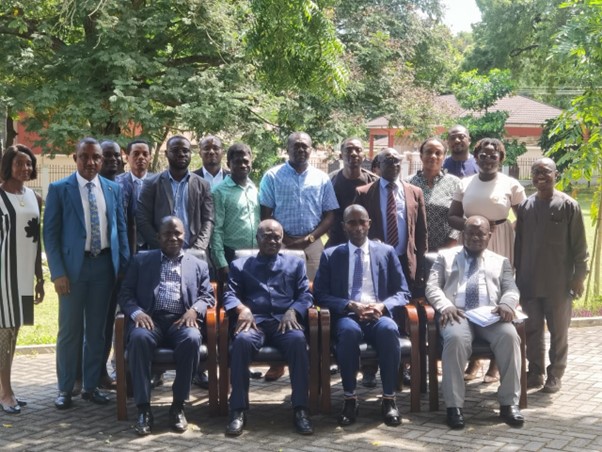- Grows 30% faster than the continental average, second only to Ethiopia’s 81%
- Outpaces per capita income growth
- 110 Ghanaians own over US$10m in liquid assets
- Capital flight a contributory factor
Private wealth in Ghana has surged at a rate 30 percent higher than the continental average of negative 12 percent over the past decade – second only to Ethiopia’s 81 percent growth – a new research report has revealed.
This stark contrast highlights the expanding wealth disparity in the nation, with private wealth outpacing per capita income growth of 27.5 percent, setting the country apart from wider African continent where wealth is on a general decline. Capital flight, often used as a proxy for private wealth, is identified as a concerning factor.
During a recent interview at the Research Dissemination on Capital Flight and Natural Resources in Ghana, organised by the National Development Planning Commission (NDPC), Professor Leonce Ndikumana-Department of Economics, University of Massachusetts, delved into the remarkable surge of private wealth in the country.
The research findings estimate that individual private wealth in the country now stands at an impressive US$56billion. However, this wealth is starkly unevenly distributed – with 110 Ghanaians possessing over US$10million in liquid assets, not including other assets like real estate.
“This wealth concentration vividly underscores the alarming income disparity within the country,” he said. “Where the wealthiest individuals perceive Ghana as well-developed, others – such as cocoa farmers – struggle to make ends meet despite the overall growth of wealth.”
Professor Ndikumana however expressed optimism regarding the concentration of wealth, suggesting it could potentially fuel domestic investors to engage in mineral resource exploration and sectors like cocoa production.
He advocated incentives for domestic investors similar to those offered to foreign investors, as this could facilitate the emergence of Ghanaian enterprises which harness the nation’s natural resources.
Notably, Professor Ndikumana highlighted that this wealth disparity is not unique to Ghana as it is a recurring trend across many African countries, which often focus on attracting foreign investors while underestimating the potential of their domestic counterparts.
“Contrary to misconceptions, data clearly show there are sufficient local individuals with the means to invest, ” Professor Ndikumana said.

Capital flight: a pervasive issue in Ghana and beyond
Professor Ndikumana shed light on the significant issue of capital flight, emphasising that it is not unique to Ghana but affects many African nations. Ghana, over the past five decades, has experienced an estimated loss of US$50billion through capital flight. This capital flight primarily benefits private asset holders abroad, and a portion of it occurs through trade mis-invoicing, whereby traders manipulate the value of imports and exports.
Focusing on the gold sector, Professor Ndikumana noted that Ghana is not receiving its equitable share of the value generated from its gold resources. As natural resources belong to the nation, he stressed the need to revise agreements in order to ensure Ghana benefits more from its exploitation.
A concerning discrepancy was also identified in Ghana’s reported gold exports compared to statistics from its trading partners. In some cases, countries report receiving less gold from Ghana than Ghana reports exporting, raising concerns of potential capital misreporting or mis-invoicing in gold trade. Furthermore, Professor Ndikumana highlighted mining laws that allow foreign mining firms to retain most foreign exchange earned from gold exports in their home countries.
The professor provided an example that raised suspicions, saying Ghana reports South Africa as the primary destination for its gold exports – but South Africa records almost no gold imports from Ghana. Ghana exported US$15million worth of gold to South Africa, while South Africa reported only US$6.8million of gold imports from Ghana – raising questions about the whereabouts of Ghana’s exported gold.
Additionally, the under-invoicing of gold exports to the United Arab Emirates was discussed, with evidence suggesting it serves as a channel for capital flight. The opacity of gold trade statistics, along with large statistical gaps in gold exports, is a significant concern and a sign of export mis-invoicing. The overall conclusion is that Ghana’s benefits from its gold exploitation fall well below expectations.

Cocoa Sector and Value Distribution
Turning to the cocoa sector, Professor Ndikumana noted that the likelihood of capital flight through trade mis-invoicing is minimal due to the sector’s regulation and government oversight. However, the issue lies in the distribution of value. While cocoa generates substantial value, it primarily benefits foreign companies – with cocoa farmers receiving a meagre 4 percent of the market value for chocolate sold internationally.
To improve the well-being of cocoa farmers, the professor recommended processing more cocoa within the country to create jobs and increase value. He suggested that Ghana reconsider its agreements with mining companies, potentially adopting production-sharing models and encouraging national companies’ involvement in resource exploitation.










